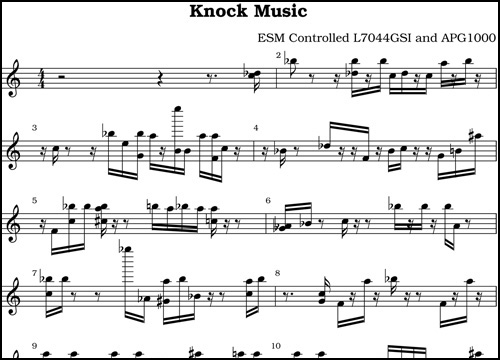I don’t recall when I first heard ‘industrial music’, but it was probably in the late 1970s when I first heard the group Throbbing Gristle on the local Harvard College radio station. I was attracted to some artists in the genre who would incorporate ‘musique concrete’ into their works – recordings of actual street or industrial noise, or bringing pipes and sheet metal and other noise-making apparatus into the studio.
But imagine that someone working in an industrial situation took the sounds all around him from his everyday life and turned it into music. That is exactly what GE engineer Jeff Bizub has done. Here is a snip from GEReports:
Engineers used to listen for just the one frequency of the knocking sound. But Bizub, who has perfect hearing, had a different idea.
“The engine is like a musical instrument,” he says. “The shape of a flute or a clarinet plays a dramatic role in the sound they produce.”
What if he could use music theory to decipher and tame knocking? Bizub started running tests with an engine going into knock in GE’s Waukesha engineering lab.
“I put my ear against the cylinder and could hear, even with earmuffs on, the multiple frequencies inside,” he says. “I knew that there was a center frequency related to bore size. But, as with any instrument, you’ll have multiple vibrations that will occur.”
Some of the knocking frequencies were inaudible to an untrained ear. But what if he built a machine with perfect pitch that could hear knock and also ignore false positives?
“The first line of defense is to determine very accurately when it is true knock and not some other noise,” he says.
Bizub convinced his boss to buy a 16-channel digital recorder in a music store for $1,200. He also purchased a suite of music software to analyze the spectrum and the frequency of the knocking sounds, and a 64-band equalizer to amplify the inaudible frequencies related to knock.
“The idea was to capture these sounds as wave files, analyze them with the music software, and plot out what’s going on,” he says.
It is an amazing – though not really unique – analytical technique, but is similar to other things that engineers have done for decades. Part of the process engineer’s tool kit is … well, whatever they already know. So whether it is someone with a laser optics background bringing those tools to a task that is neither laser-based nor optical, or the wide-spread use of a spectrum analyzer, engineers are always looking for new ways to solve problems. But Bizub turned his troubleshooting skills into something more!
The report continues:
But Bizub did not stop there. “When I was hearing the knocking frequencies, I was hearing notes,” he says. “When you study composition music theory, you work on ear training and transcribe sounds in your head to musical pitches so you can understand them further.” He took engine knocking samples, one from a big bore rich burn engine and the other from a lean burn machine, added some echo for ambiance, and called the score Knock Music. “Like electronic music or early R&B rap music, I was stringing samples together and creating something new,” he says. “I can’t take credit for writing the music because really the engines wrote it.”
Check out the video of his ‘Knock Music’:
Source: Scientific Computing

